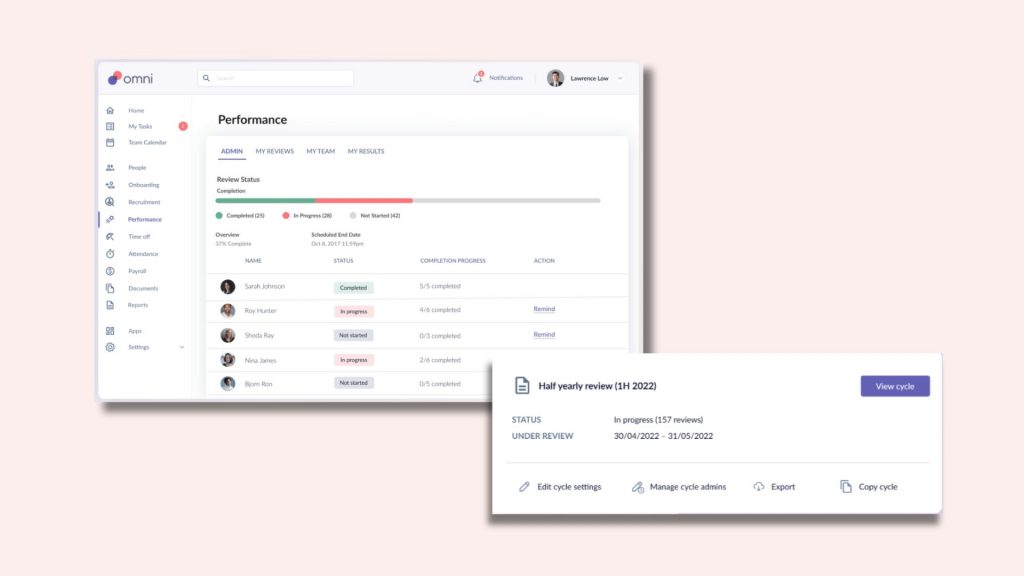It’s one thing to “feel” that your employees are engaged, but it’s another thing entirely to be able to measure and quantify it. With employee engagement directly affecting productivity (it has the power to boost it by 23%!), the risk of playing it by ear is too great to ignore.
Knowing precisely how engaged your employees are can empower you to make decisions and launch engagement initiatives that keep them motivated, productive, and most importantly, happy. One way to do that is to use employee engagement surveys, which are becoming increasingly important for measuring the pulse of a team and getting to the heart of the matter—how satisfied and fulfilled are your people?
To get you started on crafting your employee engagement survey questions, we’ve put together this list of 20 strategic employee engagement survey questions that can help you gain valuable insights into your employees’ feelings and perspectives.
Understanding Employee Engagement Surveys

An employee engagement survey is a type of questionnaire that uses specific questions to measure how engaged employees are at work. By employee engagement, we mean the extent to which employees feel passionate about their work and have a strong connection to your organization.
When done right, an employee engagement survey can also arm you with data to create strategies that will help build a successful, productive, and engaged workforce.
That’s why it’s essential to be strategic when crafting your employee engagement survey questions. Each one should be carefully chosen to uncover the true feelings of employees and spark meaningful discussions about how to improve their experience.
20 Strategic Employee Engagement Survey Questions
With that said, below are 20 sample open ended employee engagement survey questions that will delve deep into the satisfaction, motivation, commitment, and well-being of your team.
Overall Job Satisfaction
1. Do you see yourself working at [organization] in five years?
The purpose of this question is to get a sense of employee loyalty and commitment to your company.
Generally speaking, employees know if they want to stay with their current employer for the long term or not. If you find that most of your team doesn’t expect to stay with your company for the next five years, you’ll know that there’s a retention issue that needs to be addressed.
2. Are you considering exploring opportunities with a different company?
While the first question aims to measure long-term commitment, this one explores an employee’s near-term commitment to the company.
Employees who are engaged at work typically don’t consider looking for a job elsewhere. In fact, it probably doesn’t even cross their minds.
On the other hand, those who are less engaged will most likely answer “yes” to this question. As such, you may want to add a text field for more details about their thoughts on the matter.
Work Environment
1. Would you recommend this organization as a great place to work?
Think of this one as the employee engagement version of the Net Promoter Score (NPS).
Employees only recommend a company to others if they like the culture and the work environment. If you get many negative responses to this question, it’s a sign that your employees don’t view your organization in a positive light.
2. Does the company cultivate a nurturing and supportive work environment?
It’s important to get a sense of whether or not your employees feel like they have the support they need to do their jobs well.
Do they feel like there are enough resources available? Is there an open-door policy with senior management? These are all key elements in creating a positive work environment.
Communication and Feedback
1. Do you feel that your ideas and opinions are valued at the workplace?
Valuing employee input is a crucial part of creating an engaged team. Employees should be able to share their thoughts without fear of retribution.
A “yes” answer indicates that employees feel comfortable speaking up, while a “no” could mean that there’s an issue with leadership not listening to what their employees have to say.
2. Do you comprehend the reasons behind any organizational changes that occur?
Change is a necessary part of any organization, but it can be difficult for employees to understand why certain changes are being made. Asking this question will help you better understand how well your team can keep up with the changing landscape.
Do they feel like they’re kept in the loop or do they often feel confused and uncertain? This could be an indicator that the organization needs to step up its communication efforts.
Leadership and Management
1. Does your immediate manager genuinely show concern for you as an individual?
Great managers can help create an environment where employees feel supported and valued. They should be able to provide feedback that’s constructive and aims to improve performance rather than criticize.
The more concern a manager has for their direct reports, the better they’ll be able to foster an atmosphere of trust and collaboration. This question will help you determine which managers need additional training and support.
2. Does your immediate manager show genuine concern for your professional growth and development?
While this employee engagement survey question may seem similar to the last question, it’s slightly different. Here, we’re looking at whether or not managers are actively advocating for their direct reports’ future success.
Are they helping employees build the skills and knowledge needed to progress in their careers? Are they providing them with challenging opportunities and connecting them with potential mentors? This is an important factor in ensuring that high-potential employees don’t get overlooked and can reach their full potential.
Team Collaboration
1. Do you find satisfaction in collaborating with your team?
Teamwork makes the dream work! It’s important that employees feel fulfilled working together and have an understanding of how each individual contributes to overall success.
This question can uncover how your team is faring in terms of collaboration, problem-solving, and interpersonal relationships.
2. Do you feel that you can rely on your teammates?
No one likes to bear the weight of a project alone. If employees can’t depend on their teammates, then the entire team could be in danger of underperforming.
Knowing who you can count on is an important factor in driving success and fostering a feeling of trust within the team. This question will help you identify any potential issues that may be causing divisions in your workforce.
Work-Life Balance
1. Does your job provide you with the flexibility to accommodate the demands of your personal life?
Many employees feel like they’re robots, stuck in a seemingly endless cycle of working more and never taking the time to invest in their well-being, a tell-tale sign of employee burnout.
The goal of this question is to gauge not only how well you’re supporting employees to maintain a healthy work-life balance but also how satisfied they are with the amount of flexibility and autonomy that their job offers them.
2. Do you believe that you maintain a healthy work-life balance?
Work-life balance has grown to become a key focus point in many organizations, so it’s important to measure how well you’re doing.
This question can help uncover any stressors that could be preventing employees from reaching a healthy balance between their personal life and their career.
Training and Development
1. Does your current job provide you with opportunities for continuous learning and skill development?
Research has shown that 74% of employees aren’t reaching their full potential due to a lack of employee development opportunities. The result is an unmotivated workforce that feels stuck in their current position, unable to reach the next level of their career.
This question will help you understand whether your employees are getting the training and development they need to stay motivated and continue growing.
2. Do you have opportunities for advancement or promotion at this organization?
The paths to advancement and promotion can be hard to come by in some organizations. In other cases, they exist, but employees may not be aware of them or don’t have access to the resources needed to take advantage of those opportunities.
This question will help you understand if employees are feeling stuck in their current roles and unable to reach new heights within your organization.
Recognition and Rewards
1. Do you regularly receive recognition for your work?
According to a Gallup survey, companies that prioritize employee recognition are 56% less likely to have employees who are looking for a new job. Recognition and rewards programs can help employees feel valued and appreciated, which in turn can lead to higher engagement levels and improved performance.
This question will help you understand if your recognition efforts are effective or if there’s more work to be done in this area.
2. Are you receiving sufficient feedback regarding your job performance?
1 in 5 employees are dissatisfied with the feedback they’re getting at work, according to research. When employees feel that they’re working in a vacuum with no real direction or guidance from their supervisors, it can lead to low morale and disengagement.
This question will help you understand if your feedback process is sufficient and effective.
Employee Well-Being and Support
1. Do you find the work you do at the organization meaningful?
When employees derive a sense of meaning from their work, it has a profound impact on their performance. McKinsey research revealed that when employees find a sense of meaning in their work, their productivity increases by 33%, commitment to the organization rises by 75%, and talent is significantly less likely to consider leaving, with a decrease of 49% in attrition rates.
As a result, this question is of paramount importance, as it will help you understand if your employees are satisfied with the nature of their work.
2. Do you feel like you belong here?
Well-being feeds directly into engagement and job satisfaction. When employees feel like they belong to an organization, it can lead to increased motivation levels, improved job performance, and higher commitment levels. In contrast, when employees feel isolated and disconnected, it can lead to a disengaged workforce.
Asking this question will help you understand how your employees perceive the workplace culture and how well they’re doing on the belonging front.
Organizational Culture and Values
1. Do the vision, mission, and values of the organization align with your own and serve as a source of inspiration for your work?
Employees want to work for an organization that aligns with their own values and provides a sense of purpose. The question here is whether or not employees feel inspired by your organization’s vision, mission, and values.
This can help you identify if there’s a disconnect between what your organization stands for and how it behaves in practice. Better yet, it can help you pick up on whether employees are actually aware of the organization’s guiding principles.
2. Do you understand your role in showcasing your organization’s values?
In many scenarios, employees are the public face of an organization and thus need to be aware of the company’s values.
This question can provide valuable insights into whether employees understand their role in reinforcing the organization’s core beliefs and how they can use them as a guide for behavior. It can also help you identify areas where more education is needed, or if there may be confusion surrounding organizational values.
Deepen Your Employee Engagement with Omni

By now, it’s visible how important employee engagement is for any business. From boosting morale and trust to increasing productivity and loyalty, it’s a key factor in driving an organization forward. By putting these 20 open ended employee engagement survey questions into action, you won’t leave your employees’ level of engagement up to chance.
But from there, you’ll have a new challenge: how to leverage the data you’ve collected to create meaningful change.
At Omni, we understand that empowering employees through the right support and resources is essential for their engagement. That’s why our platform offers a comprehensive suite of tools that make it easy to manage the end-to-end employee lifecycle. Whatever the stage of your engagement initiatives, Omni can help you build a tailored solution that takes your employee experience to the next level.
Book a demo today and see how our full suite functions in action!


